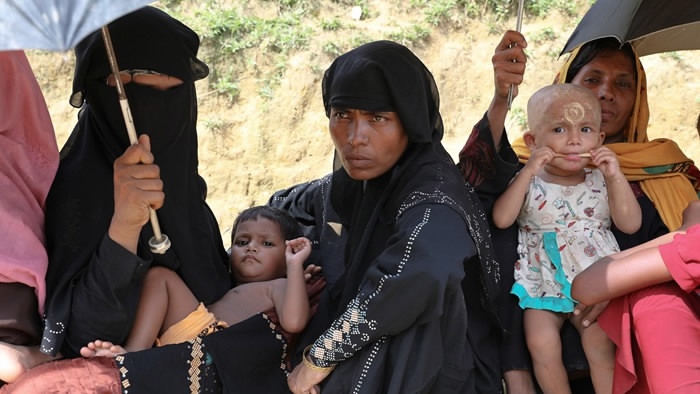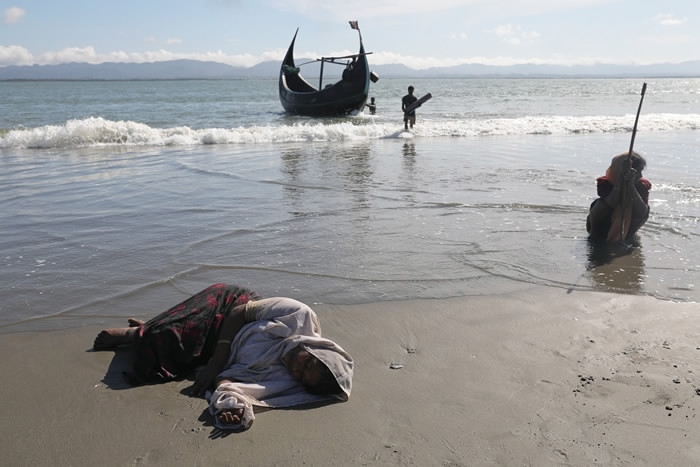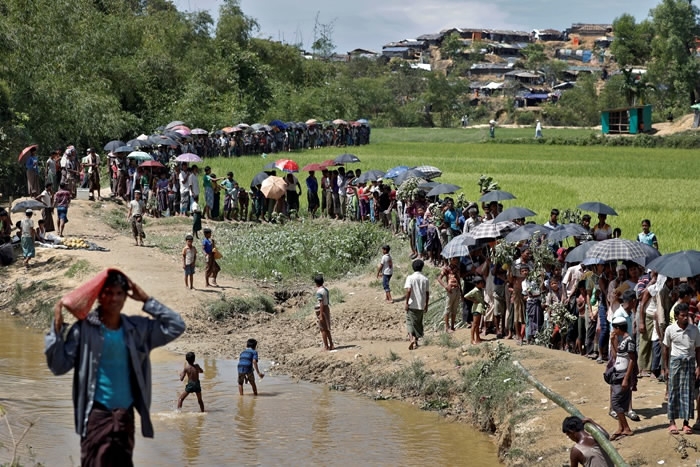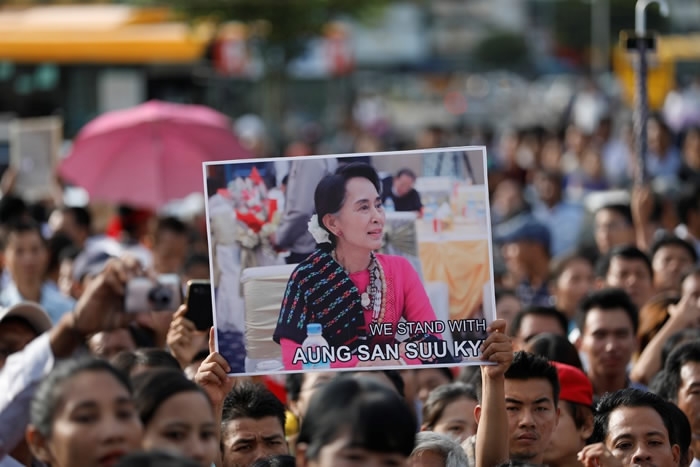
Politics
17:14, 02-Oct-2017
Myanmar 'makes proposal' to take back Rohingya refugees
CGTN

Myanmar has proposed taking back the hundreds of thousands of Rohingya who have fled to Bangladesh in recent weeks, the Bangladeshi Foreign Minister said after talks with a senior Myanmar representative on Monday .
"The talks were held in a friendly atmosphere and Myanmar has made a proposal to take back the Rohingya refugees," A.H Mahmood Ali told reporters.
Bangladesh opened talks with neighboring Myanmar on Monday with the aim of securing the return home of more than half a million Rohingya Muslim refugees from Myanmar, most of whom have arrived since late August.

Rohingya women collapse from exhaustion as they arrive by a wooden boat from Myanmar to the shore of Shah Porir Dwip, in Teknaf, near Cox's Bazar in Bangladesh, October 1, 2017. /Reuters Photo
Rohingya women collapse from exhaustion as they arrive by a wooden boat from Myanmar to the shore of Shah Porir Dwip, in Teknaf, near Cox's Bazar in Bangladesh, October 1, 2017. /Reuters Photo
The United Nations has called the exodus of 507,000 Rohingya since August 25 the world's fastest-developing refugee emergency and says Buddhist-majority Myanmar is engaging in ethnic cleansing against its Rohingya Muslim minority.
Myanmar rejects that. Its forces launched an offensive in the north of Rakhine State in response to coordinated attacks by Rohingya insurgents on August 25.
Myanmar blames the insurgents for attacks on civilians and for setting most of the fires that have reduced more than half of more than 400 Rohingya villages in the north of Rakhine to ashes. The insurgents deny that.
Myanmar says more than 500 people have been killed in the latest violence, most of them were insurgents.
Bangladeshi Prime Minister Sheikh Hasina has called for an end to the violence and for safe zones to be set up in Myanmar to enable refugees to return.
She has also called for a UN fact-finding mission to go to Myanmar and for Myanmar to implement recommendations on solving problems in Rakhine drawn up by a team led by former UN Secretary General Kofi Annan.

Rohingya refugees queue for aid in Cox's Bazar, Bangladesh, October 1, 2017. /Reuters Photo
Rohingya refugees queue for aid in Cox's Bazar, Bangladesh, October 1, 2017. /Reuters Photo
Bangladesh will focus on those five proposals in talks in Dhaka on Monday with Myanmar government official Kyaw Tint Swe, in particular, the sustainable return of the refugees, a Bangladeshi Foreign Ministry official said.
"We don't think this crisis is going to be resolved in just one meeting," said the Bangladeshi official who declined to be identified as he is not authorized to speak to media on the record.
Western criticism on Myanmar
The crisis over Myanmar's treatment of the Rohingya is the biggest problem national leader Aung San Suu Kyi has had to face since forming a government last year after winning a landmark election in late 2015.
Suu Kyi, in an address to the nation last month, said Myanmar was ready to start a verification process under a 1993 agreement with Bangladesh and "refugees from this country will be accepted without any problem."
There were already about 300,000 Rohingya refugees in Bangladesh before the most recent exodus.

Supporters hold a poster of Myanmar's State Councilor Aung San Suu Kyi during a rally in Yangon, Myanmar, September 24, 2017. /Reuters Photo
Supporters hold a poster of Myanmar's State Councilor Aung San Suu Kyi during a rally in Yangon, Myanmar, September 24, 2017. /Reuters Photo
The Nobel peace laureate has been accused by Western critics of not speaking out strongly enough on behalf of the minority and of defending the army's actions.
The Rohingya are denied citizenship in Myanmar and classified as illegal immigrants, despite claiming roots there that go back centuries.
Suu Kyi has no power over security policy under a military-drafted constitution and the public in Myanmar, where Buddhist nationalism has surged over recent years, largely supports the offensive against the insurgents.
The United States, in its strongest criticism of Myanmar over the crisis, called last week on countries to suspend providing weapons to Myanmar's military. But it stopped short of threatening to reimpose US sanctions, which were suspended under the Obama administration.
A protest against Western pressure and foreign media coverage of the crisis is planned in the biggest city of Yangon on Monday.
3121km
Source(s): AFP
,Reuters

SITEMAP
Copyright © 2018 CGTN. Beijing ICP prepared NO.16065310-3
Copyright © 2018 CGTN. Beijing ICP prepared NO.16065310-3